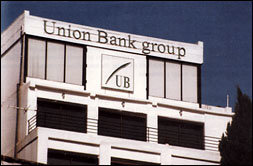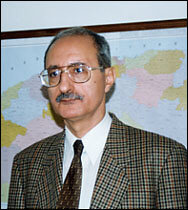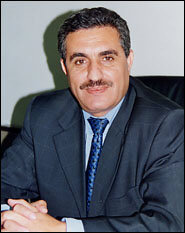 FINANCING FUTURE GROWTH FINANCING FUTURE GROWTH |

Private companies have emerged in different sectors, among them Union Bankand Khalifa Bankin the financial sector.
A major focus for most banks has been the development of small and medium size companies. "We know that SMEs contribute widely to the national added value in different fields of activity, hence our choice to give attention to this category" states Amrouche when talking about Khalifa Bank's focus. "Thanks to innovative products and services, we believe we can satisfy the needs of private individuals who have been neglected, as well as consumers and average employees who have the right to expect more."
Foreign banks have also seized the opportunity of SME financing, and with the arrival of Citibank, Natexis, Société Générale, BNP Paribas and Arab Banking Corporation, private Banks are starting to compete with public banks. While public financial institutions used to hold the monopoly for financing, investment and the economy as a whole, today they bear the brunt of the public sector collapse, posting a total deficit of 2000 billion Dinars, thus becoming completely drained with weak credit capacity. Therefore, to meet the financing and managing needs of investors, businessmen have turned to the private sector.
Union Bankis one of the most prominent merchant Banks in Algeria belonging to Chairman Brahim Hadjas. Created in 1995 and considered as the first Algerian private Bank, Union Bank increased its profits by 105% in 1997, before it had its foreign trade license suddenly revoked. However, three years later, Union Bank was able to get its license back.
"After the liberalization of the Algerian economy, the financial system was liberalized but the legal framework behind the implementation of financing instruments, apart from classical banking instruments, was non existent". After having fought to set up Union Bank, Hadjas is fully determined to develop the potential of Algeria's financial sector so as to provide the country with the necessary financing for its economic development. "We have to create our own businesses, and this requires a vehicle to allow foreign investment," so Union Bank is taking a leading role in offering investment services and funds.

The private sector is not only present in the world of finance with its own banking institutions, it is also in the field of insurance. According to a study conducted by the National Council of Insurance, the Algerian market should be eight times more important in the coming five years. Hadj Said, Chairman of L'Algérienne Des Assurances (2A)thinks there will be a "market boom" which will follow the country's economic development during the next 10 years.
| "Personal insurance is a market opportunity that has not yet been exploited", points out Hadj Said. Although this market is limited to US$ 300 million per year, its potential in the long run is much greater, and local companies are getting ready for it. This is well illustrated by 2A, which has opened 80 branches, and is poised to further expand its operations next year. However, Hadj Said believes that "the laws regulating insurance activity in Algeria are not in touch with the economic situation of the country". He remains optimistic about upcoming reforms and insists that his "objective is to create a company with the same standards as foreign companies". He also adds that his company already has strong relations with Alliance, Suisse Ré, Score and Generali, as well as assistance contracts for international human resources training.
The dynamic and flexible aspects of the private sector are in stark contrast with the public sector. Public banks generally offer poor quality services, far inferior to international standards. Once again, the only solution to be considered is privatizing, a process that should intervene once the financial situation of these banks is reformed and restructured.

Within the context of private sector competition and privatization, CPA(Crédit Populaire d'Algérie) is probably the main bank in Algeria that is ready for restructuring. El Hachemi Maghlaoui, Chairman of CPAstates that: "everybody agrees that the public sector cannot compete with the private sector" at the present time. So Maghlaoui is conducting a campaign to reorganize CPA, restructure its portfolio and modernize its information system.
"Banking reform is already in progress, but the key element missing is partnership. To this effect, we have had talks and proposals from a number of very important international banks, which showed their readiness for a partnership with CPAregulated by management contracts. There is even a possibility for these foreign banks to participate in the opening of the bank's capital."
As far as the secondary market is concerned, the Algiers Stock Exchange, inaugurated in 1998, operates with only one quotation per week and four listed companies. The Stock Exchange is therefore waiting for a surge of IPOs from the privatization program, which could include twenty public companies on a public offer in the next two years. |

